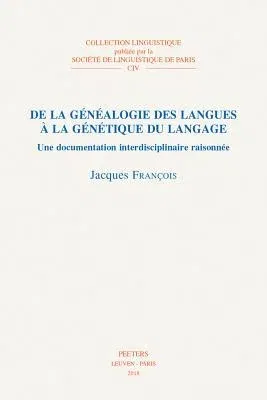English summary: Since the end of the 18th century, philologists and
then linguists, particularly German linguists throughout the 19th
century, have studied the genealogy of all the languages of the
Indo-European and Semitic families. At the same time, the naturalistic
orientation of linguistics propagated by August Schleicher was rejected
by most of his peers, notably Breal and Saussure. Since the 1950s,
genealogical linguists have tested family and superfamily grouping
methods applicable to languages without written tradition with
lexicostatistics, glottochronology, multilateral comparison and their
recent developments within applied informatics. As for the genetic
exploration of language, it disappeared from the agenda of linguists for
an entire century before being renewed from 1990 onwards. The central
objective of this work is to search for the missing link between the
genealogy of languages and the genetics of language as a universal
faculty of the human species. The version of grammaticalization theory
developed by the German africanist and typologist Bernd Heine can
provide a connection between the two approaches, since it aims to
identify a catalogue of lexicalized cognitive universals in all
languages and which are at the source of grammatical words and
derivational and flexional morphemes that allow us to imagine the
genesis of general grammar and particular grammars. Aimed at linguists,
the book extensively documents the work of researchers in other
disciplines (evolutionary psychologists and anthropologists, prehistoric
archaeologists, epistemologists) who wish to provide indirect evidence
of the emergence of a lexical protolanguage, then of a grammaticalized
language. In contact with these researchers, a new discipline has
emerged, evolutionary linguistics, which seeks to assess the
plausibility of this indirect evidence. French description: Depuis
la fin du 18e siecle, les philologues, puis les linguistes, notamment
allemands tout au long du 19e siecle, ont parcouru la genealogie de
toutes les langues des familles indo-europeenne et semitique. Dans le
meme temps, l'orientation naturaliste de la linguistique propagee par
August Schleicher a ete rejetee par la plupart de ses pairs, notamment
Breal et Saussure. A partir des annees 1950 les linguistes genealogistes
ont teste des methodes de regroupement par familles et superfamilles
applicables aux langues sans tradition ecrite avec la lexicostatistique,
la glottochronologie, la comparaison multilaterale et leurs
developpements informatiques recents. Quant a l'exploration genetique du
langage, elle a disparu de l'agenda des linguistes pendant un siecle
entier avant de se renouveler a partir de 1990. L'objectif central de
cet ouvrage est de chercher le lien manquant entre la genealogie des
langues et la genetique du langage comme faculte universelle de l'espece
humaine. La version de la theorie de la grammaticalisation developpee
par l'africaniste et typologue allemand Bernd Heine peut fournir une
connexion entre les deux approches, car elle vise a degager un catalogue
d'universaux cognitifs lexicalises dans toutes les langues et qui sont a
la source de mots grammaticaux et de morphemes derivationnels et
flexionnels qui permettent de s'imaginer la genese de la grammaire
generale et des grammaires particulieres. S'adressant aux linguistes,
l'ouvrage documente abondamment les travaux de chercheurs d'autres
disciplines (psychologues et anthropologues evolutionnistes,
archeologues prehistoriens, epistemologues) desireux de fournir des
preuves indirectes de l'emergence d'un protolangage lexical, puis d'un
langage grammaticalise. Au contact de ces chercheurs, une nouvelle
discipline est apparue, la linguistique evolutionnaire, qui cherche a
evaluer la plausibilite de ces preuves indirectes.

